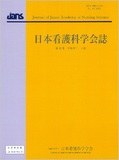Japanese
English
- 販売していません
- Abstract 文献概要
- 参考文献 Reference
要旨
目的:男性看護師におけるHopeを媒介としたワーク・エンゲイジメント(WE)プロセスモデルを明らかにする.
方法:混合研究法の説明的デザインを用いた.男性看護師839名にWeb調査を行い,WEプロセスモデルを構造方程式モデリングで検証した.同意を得た13名に半構造化面接を行い,内容を量的結果と統合した.
結果:228名を解析対象とした(有効回答率27.2%).WEプロセスモデルとして,上司の配慮,看護関連資格,進学の支援がHopeを仲介しWEに影響していた(GFI=.951,AGFI=.906,RMSEA=.084).対象者は男性役割を意識しており,上司の配慮とHopeの関連は「支援の充実した組織でキャリアアップを目指す」等で説明された.
結論:男性看護師のHopeを媒介したWEプロセスモデルを混合研究法で明らかにした.男性看護師は性別意識を持つ一方,仕事と家庭の両立も意識していた.
Aim: We identified a hope-mediated work engagement ("WE") process model in male nurses.
Methods: An explanatory design using mixed methods research was used. A web-based survey was administered to 839 male nurses, and a process model of WE was tested using structural equation modeling. Thereafter, semi-structured interviews were conducted with 13 consenting participants, and the content was integrated with quantitative results.
Results: Responses of 228 participants were included in the analysis (valid response rate 27.2%). As a process model of WE, supervisor consideration, nursing-related qualifications, and support for higher education mediated hope and influenced WE (GFI=.951, AGFI=.906, RMSEA=.084). Participants were aware of their male role, and the association between supervisor consideration and hope was explained by "career advancement in a more supportive organization," etc.
Conclusion: In the process of clarifying hope-mediated WE process model among male nurses using a mixed method research, male nurses were found to be gender-aware; however, they were also aware of balancing work and family life.
Copyright © 2023, Japan Academy of Nursing Science. All rights reserved.


